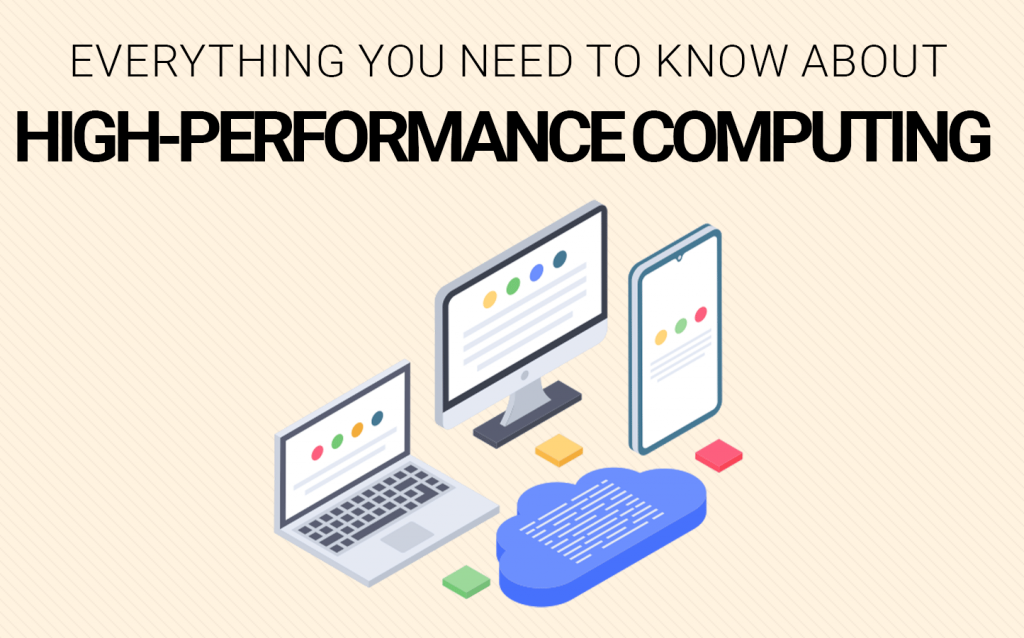
High-Performance Computing: Everything You Need To Know
The ability to analyse data and carry out complex operations quickly is known as high-performance computing (HPC). For comparison, a laptop or desktop with a 3 GHz CPU can do about 3 billion computations in a second. Even while that is significantly quicker than anything a person could manage, HPC systems that are capable of performing quadrillions of calculations per second overshadow it.
The supercomputer is one of the most well-known forms of HPC systems. Thousands of computing nodes are found in a supercomputer, and they collaborate to finish one or more tasks. We refer to this as parallel processing. It is comparable to having thousands of PCs networked together to combine compute power and speed up task completion.
What makes HPC so crucial?
Data is the fuel for game-changing inventions, the source of ground-breaking scientific discoveries, and the improvement of billions of people’s quality of life worldwide. Advancements in science, industry, and society all rely on HPC.
The number and volume of data that enterprises must work with are expanding due to the impact of technologies like the Internet of Things (IoT), artificial intelligence (AI), and 3-D imaging. The capacity to analyse data in real time is essential for many tasks, like streaming a live athletic event, monitoring a storm’s progression, testing new goods, and examining market trends.
Organizations require fast, very reliable IT infrastructure to process, store, and analyse vast volumes of data in order to stay one step ahead of the competition.
How does HPC operate?
The three main components of HPC are computing, storage, and network.
Compute servers are networked together to create a cluster in order to develop a high-performance computing architecture. On the cluster’s servers, software applications and algorithms execute simultaneously. To collect the output, the cluster is networked to the data storage. These components work in tandem to execute a wide range of tasks.
But what is an HPC cluster? An HPC cluster is composed of hundreds or thousands of computing machines that are linked together over a network. Each server is known as a node. Each cluster’s nodes operate in parallel with each other, increasing processing speed and delivering high-performance computing.
To function at peak efficiency, each component must keep up with the others. The storage component, for example, must be able to feed and ingest data to and from compute servers as rapidly as it is processed. Similarly, the networking components must be capable of supporting high-speed data transit between compute servers and data storage. When one component cannot keep up with the others, the overall performance of the HPC infrastructure suffers.
Where is HPC used?
HPC systems are utilised for a variety of purposes across multiple industries and can be deployed on-premises, at the edge, or in the cloud. Below we provide examples of HPC use in different fields:
- Machine learning and AI (artificial intelligence). HPC is employed to identify credit card fraud, offer self-directed technical help, teach self-driving cars, and improve cancer detection methods.
- Media and entertainment. HPC is used to edit films, produce special effects, and stream live events all over the world.
- Research laboratories. HPC is used by scientists to discover new sources of renewable energy, comprehend the history of the universe, forecast and monitor storms, and develop innovative materials.
- Financial Services. HPC is used to watch stock changes in real-time and to automate trading.
- Gas and oil. HPC is used to more correctly determine where new wells should be drilled and to help increase productivity from existing wells.
- HPC is used to assist in the creation of treatments for diseases such as diabetes and cancer, as well as to enable faster and more accurate patient diagnostics.
- HPC is used to develop new products, simulate test situations, and ensure that parts are kept in stock in order to keep manufacturing lines running smoothly.
HPC and NetApp
The NetApp HPC solution includes a whole line of high-performance, high-density E-Series storage systems. A modular design with an industry-leading price/performance ratio provides a pay-as-you-grow solution to satisfy storage requirements for multi-petabyte datasets. To manage the performance and reliability needs of the world’s greatest computer infrastructures, the system is integrated with prominent HPC file systems such as Lustre, IBM Spectrum Scale, BeeGFS, and others.
E-Series systems deliver the performance, reliability, scalability, simplicity, and lower TCO required to meet the challenges of handling extreme workloads:
- Performance. Up to 1 million random read IOPS and 13GB/sec, sustained write bandwidth per scalable building block are enabled. The NetApp HPC solution, which is optimised for both flash and spinning media, features built-in technology that monitors workloads and automatically modifies settings to optimise performance.
- Reliability. The fault-tolerant design provides more than 99.9999% availability, as shown by over 1 million deployed systems. Data Assurance elements built into the software help ensure that data is correct, with no failures, corruption, or missing bits.
- Easy to implement and manage. Modular design, on-the-fly replication of storage blocks (“cut and paste”), proactive monitoring, and automation scripts all contribute to simple, rapid, and flexible management.
- Lower TCO. Price/performance optimised building blocks and the industry’s greatest density per provide minimal power, cooling, and support costs, as well as four times lower failure rates than commodity HDD and SSD devices.
- Scalability. A granular, building-block approach to scaling that allows for smooth scalability from terabytes to petabytes by adding capacity in any increment—one or several drives at a time.
Was this article helpful?
Support us to keep up the good work and to provide you even better content. Your donations will be used to help students get access to quality content for free and pay our contributors’ salaries, who work hard to create this website content! Thank you for all your support!
Reaction to comment: Cancel reply